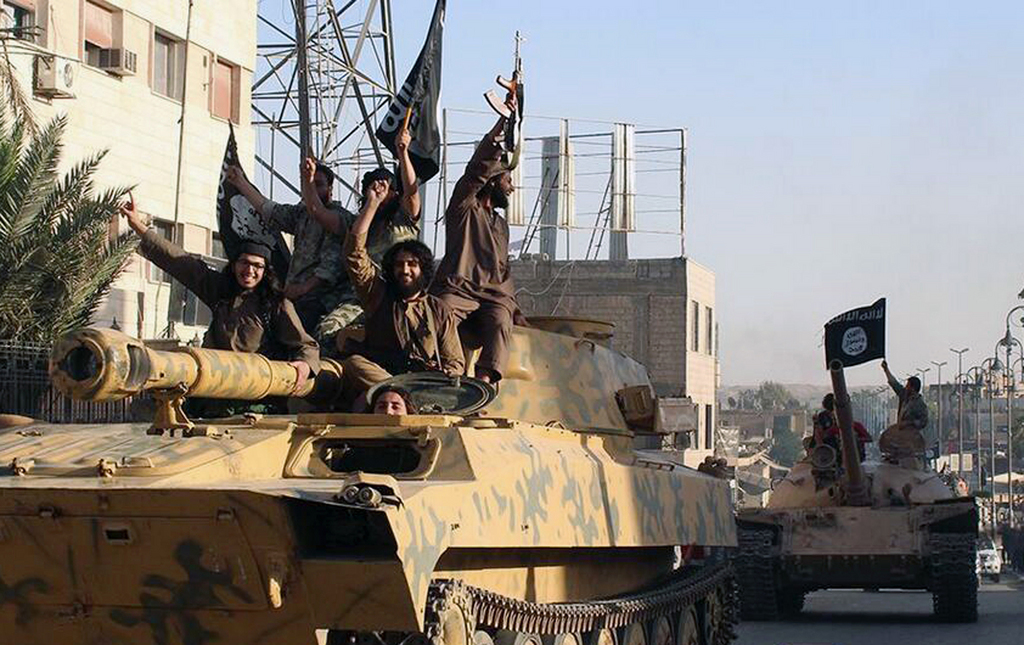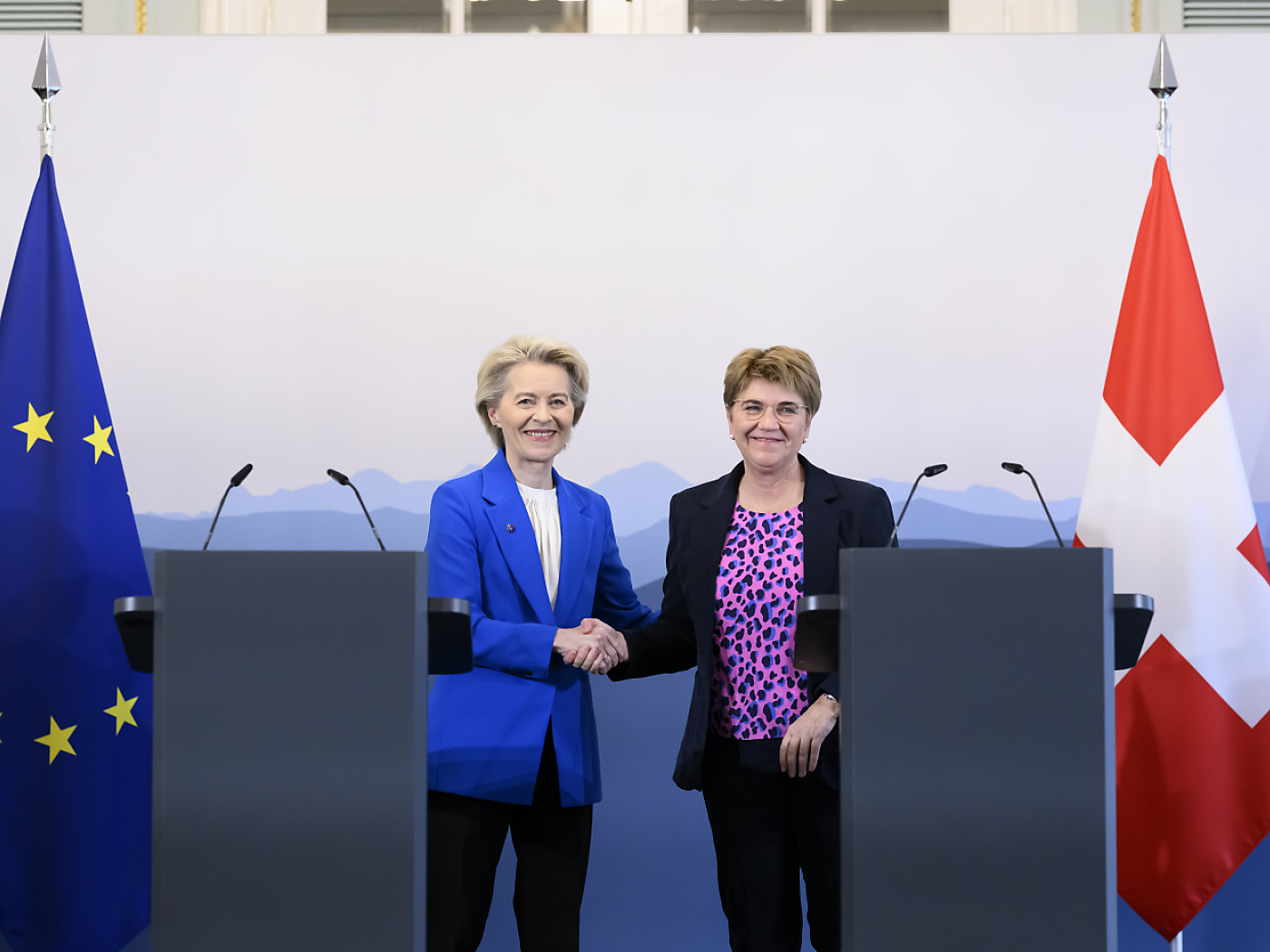The ‘unprecedented’ challenge posed by Islamic State

United States President Barack Obama’s pledge to extend air strikes to Islamic State targets in Syria relies on other states’ readiness to participate in military action against the terrorist group. Switzerland, invoking its neutrality, has limited its involvement to humanitarian assistance and diplomatic efforts.
In a televised address to the nation on Wednesday, Obama said America would lead a broad coalition to roll back the terrorist threat, following consultations with allies abroad. The US began launching air strikes in Iraq four weeks ago.
“Our objective is clear: We will degrade, and ultimately destroy, ISIL [preferred Washington acronym] through a comprehensive and sustained counter-terrorism strategy.”
The terrorist militia, which recently renamed itself Islamic State (IS), has carved out what it calls a “caliphate” from broad areas in Iraq and Syria and uses savage methods that have included the massacre of prisoners and beheading of hostages.
Western response
So far the Western military response has included air strikes by the US and arms supplies to Islamic State opponents.
However Switzerland, invoking its neutrality, has limited its involvement to providing humanitarian assistance and supporting the diplomatic efforts of international organisations. In the view of Islam expert Reinhard Schulze, this is a good thing.
The United Kingdom had already been named as a member of the “core coalition” led by the US. The other allies include Germany, France, Italy, Turkey, Australia, Canada, Poland and Denmark.
UK prime minister David Cameron previously declared his support for US air strikes in Iraq and has said that direct action by British planes has not been ruled out. Earlier this month, the German government announced its decision to deliver weapons, munitions and vehicles to the Kurds in northern Iraq fighting against IS – enough to equip 4,000 fighters.
This is the first time since the Second World War that Germany will deliver weapons to a war zone.
Switzerland has taken a different path. It condemns the “brutal acts in the strongest possible terms” and “fulfils its international obligations relating to [IS],” but it does so without weapons, the Swiss foreign ministry wrote in response to questions from swissinfo.ch.
“The War Materiel Act does not allow weapons trade with foreign countries when the country in question is involved in an armed conflict”.
To act or not?
What is ethically right? Those who take action must bear the consequences. But responsibility is borne not only by those who take action, but also by those who do not, said Angela Merkel, the German chancellor, in her justification for the German arms deliveries.
Should the Kurds in northern Iraq be supported with weapons that make it possible for them to stand up to the well-equipped terrorists, or is it more important to abide by the principle that conflicts must be resolved politically and not militarily?
“There is general confusion about choosing the right strategy. We are in an unprecedented situation, ” said Schulze, Islam expert and professor at the universities of Bern and Freiburg.
“From a moral point of view, one should do everything possible to halt the murderous actions of Islamic State. But it is also important to be aware of the consequences that may result through military action.“
With regard to weaponry, Germany will explicitly support only the Peshmerga, the armed forces of the semi-autonomous Iraq Kurdistan, but not the Kurdistan Worker’s Party (PKK). This begs the question of whether the PKK are ‘bad Kurds’.
“That is exactly the problem,” said Schulze. “You have to try to form alliances with reliable partners in the region. But identifying partners who are somehow within the political spectrum of the Western states is not so simple”.
Schulze has no answer to the question of how Islamic State terror could be faced without the force of arms. There is only the choice between two evils. As to the evil of a military assault on IS, Schulze observed it “would be a boost in propaganda for Islamic State, because the group could portray itself as the definitive Islamic force standing up against the West.”
Major exception
Merkel is also aware that the conflict cannot be resolved permanently by militarily means. The key to peace in Iraq lies in a political process that involves all sections of the population, said the German chancellor. But there are exceptional circumstances, she said, “in which only military help can provide the means to achieve a political resolution again.”
The foreign ministry confirmed that the Swiss government has observed an increase in people traveling to the occupied jihadist zones in Syria and Iraq. It does not rule out “that jihadists who have connections to Switzerland are involved in organising and carrying out attacks, which could also take place outside of the conflict zone.”
According to the Federal Intelligence Service (FIS) of the Swiss government, there are 40 jihadists from Switzerland on the ground in Somalia, Afghanistan, Yemen, Iraq and Syria. The preferred destination of these people is to the fighters in the “holy war” in Syria. On their return certain jihadists could be a potential danger. The foreign ministry, in its written response to swissinfo.ch, noted that Switzerland has put this matter on the political agenda of the Organization for Security and Cooperation in Europe (OSCE), of which it currently holds the presidency.
The Swiss foreign ministry further stated that Switzerland has supported the holding of a special session of the Human Rights Council in Geneva. The High Commissioner for Human Rights has been granted a mandate to investigate human rights violations by Islamic State.
Wait and hope?
Will diplomatic measures alone make an impression on Islamic State? Western governments are highly doubtful. By way of answer to those who insist that an solution must be found through the United Nations, Merkel posed the question: “Can we wait and hope that others will face this acute danger ? No. This does not correspond to our concept of responsibility in this situation.”
Where does this leave the Swiss concept of responsibility? One of the main pillars of its foreign policy is the principle of neutrality. This means that a state does not become involved in armed conflict between other states. Is this an excuse to leave it to others to put a stop to Islamic State?
“I do not think it is merely an excuse for Switzerland not to participate in the military support of the Kurds and the Iraqi or even the Syrian government,” said Schulze, alluding to the fact that the Syrian dictator Bashar Al-Assad is also fighting Islamic State.
“The West already outmanoeuvred itself in 2011 with its mistaken response to the Arab Spring, especially the uprising in Syria,” said Schultz. This in turn led to the exponential worsening of the situation in Iraq. The West failed to support structural measures that would have led to a stabilisation or even the overthrow of the Syrian regime.
“A major blunder,” according to Schultz. “This completely destroyed the moral status of the West in the Arab world, at the latest after the poison gas attacks in Damascus”.
Schultz sees a way out of the chaos. Instead of preserving the existing nation-states, new structures should be created which lead to more autonomy for certain regions. “I could imagine, for example, a Sunni state in the Iraqi-Syrian area where the local elites or the tribes would stand against this dominance of the 40,000 IS followers, who in actuality make up at most 0.5% of the population.”
But international diplomacy, with its theories of the inviolability of sovereignty that are at the core of the nation-state, is still far away from such a vision, according to Schulz. The response of the Swiss foreign ministry confirms this: “Territorial sovereignty and integrity must be respected in accordance with international law .”
The hunt for Islamic State
Islamic State is now in control of large areas of northern Iraq and regions in Syria. The Islamist fighters act with extreme brutality in the areas they dominate. For several weeks the US has led aerial attacks on Islamic State positions in northern Iraq. Following Obama’s latest announcement, these attacks will be extended to Syria.
Earlier this week the Arab League announced a decisive approach against Islamic State. After a meeting of the league in Cairo the chairman said ministers had agreed to “comprehensive measures against terrorism: political, security and ideological.”
US officials want allies to join in attacks on the group as well as in training and equipping Iraqi forces and Syrian rebels, providing humanitarian relief and intelligence.
RUAG ammunition
Switzerland does not allow delivery of weapons to war zones, also not in support of the fight against Islamic State. Nevertheless, according to the newspaper ‘Schweiz am Sonntag’ assault rifle ammunition from the RUAG armament factory in Switzerland has been used against the IS terrorist militia. Among the €70 million in war material that Germany will deliver to the Kurdish ‘Peshmerga’ are four million rounds of G36 ammunition, called DM11. One of two manufacturers and suppliers of this ammunition for the armed forces is the German subsidiary of the Swiss arms company, RUAG Ammotec GmbH in Fürth.
Switzerland has spent CHF8.6 million so far this year to support its on-site partner organisations (International Committee of the Red Cross, Save the Children Switzerland and the Norwegian Refugee Council) that are assisting the displaced in Iraq. In addition, three experts from the Swiss Humanitarian Aid Unit were deployed to the UN to support humanitarian relief efforts in northern Iraq. According to the Federal Department of Foreign Affairs further assistance is being reviewed. The humanitarian commitment to the victims of the war in Syria since its outbreak in March 2011 amounts to CHF85 million.
(Adapted from German by Kathleen Peters)

In compliance with the JTI standards
More: SWI swissinfo.ch certified by the Journalism Trust Initiative












You can find an overview of ongoing debates with our journalists here . Please join us!
If you want to start a conversation about a topic raised in this article or want to report factual errors, email us at english@swissinfo.ch.